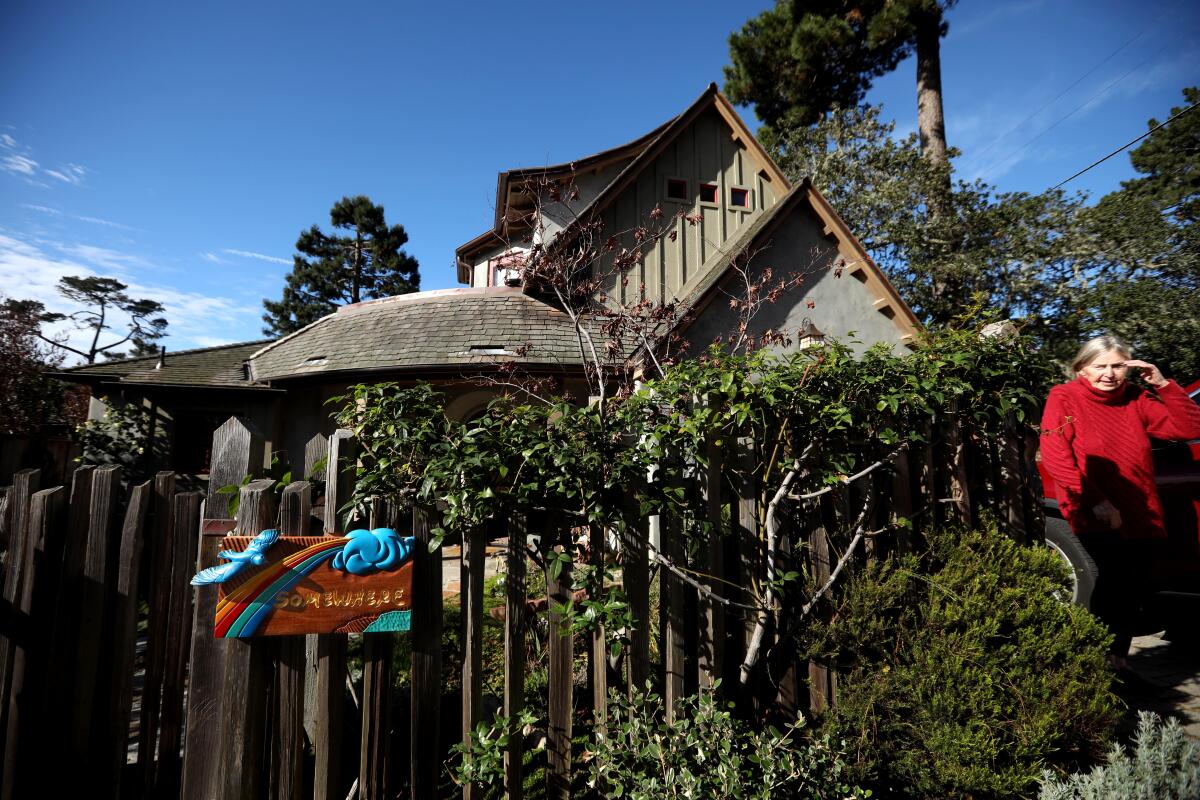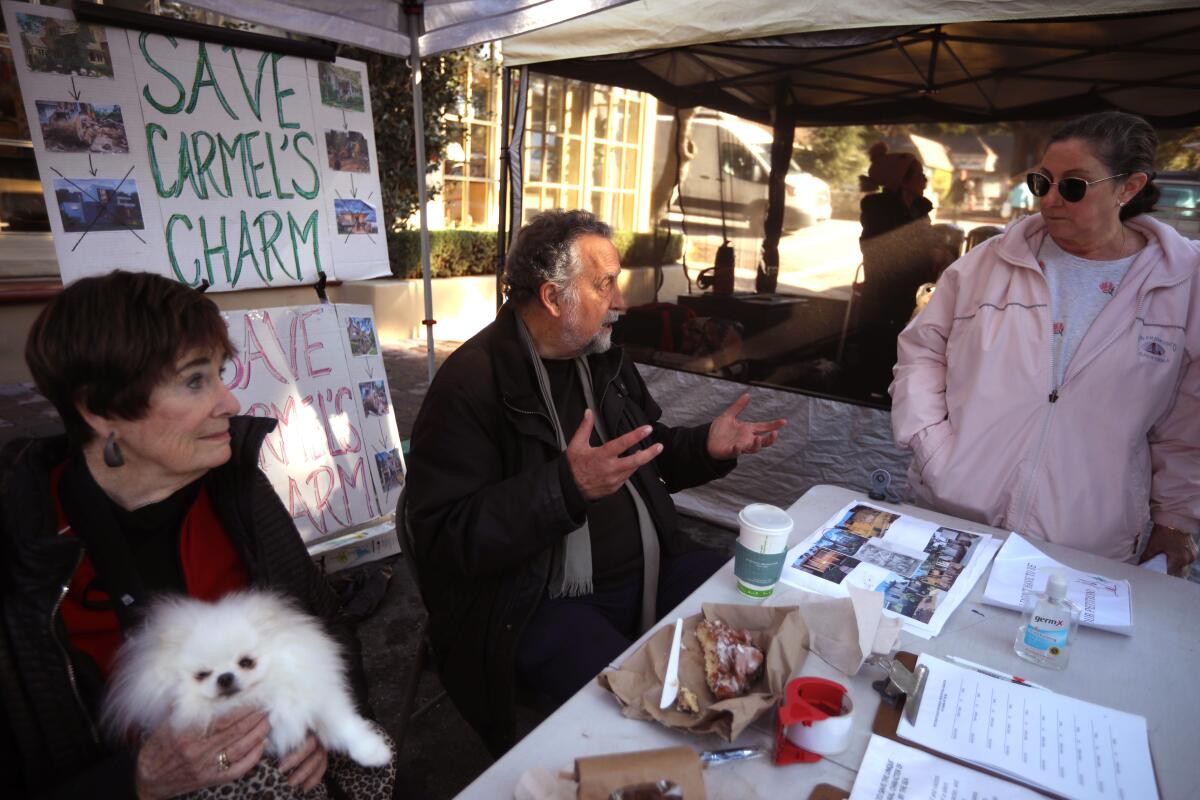After decades of resistance, Carmel-by-the-Sea is about to address some of its residents’ biggest frustrations.
Quite literally.
The moneyed little town, where homes and businesses have no street addresses, soon will have numbers assigned to its buildings, forgoing a cherished local tradition after too many complaints about lost packages, trouble setting up utilities and banking accounts, and other problems.
The Carmel-by-the-Sea City Council approved establishing street addresses in a 3-2 vote earlier this month, with proponents citing public safety concerns and the need to abide by the state fire code, which requires buildings to be numbered.
“Do we need to wait for someone to die in order to decide that this is the right thing to do? It is the law,” said Councilmember Karen Ferlito, who voted in favor of addresses.
Rather than street numbers, residents in the town of 3,200 have long used directional descriptors: City Hall is on the east side of Monte Verde Street between Ocean and 7th avenues. And they give their homes whimsical names such as Sea Castle, Somewhere and Faux Chateau.
There is no home mail delivery. Locals pick up their parcels at the downtown post office, where, many say, serendipitous run-ins with neighbors are an essential part of the small-town charm.
For more than 100 years, residents fought to keep it that way, once threatening to secede from California if addresses were imposed. They argued that the lack of house numbers — along with other quirks, such as no streetlights or sidewalks in residential areas — added to the vaunted “village character.”
“We are losing this place, day by day and week by week, from people who want to modernize us, who want to take us to a new level, when we want to stay where we are,” Neal Kruse, co-chair of the Carmel Preservation Assn., said during the July 9 City Council meeting at which addresses were approved.

Carol Oaks stands in front of her home, which is named “Somewhere” and has no formal address. Carmel-by-the-Sea will soon number its homes and businesses.
(Genaro Molina / Los Angeles Times)
The debate over street numbers has simmered for years and intensified during the COVID-19 pandemic, when people began shopping online more frequently and struggled to get their packages delivered.
Some residents and tourists worry that if they have an accident or a medical issue, emergency responders will have trouble finding them. Others have had trouble receiving mail-order prescriptions and medical equipment.
“This is a life-and-death situation in my life and my family,” resident Deanna Dickman told the City Council. “I want a street address that people can find on GPS and get there, and my wife can get the medication she needs.”
Dickman said her wife needs a shot that comes through the mail and must be refrigerated. If she can’t get it delivered, she has to travel to an infusion center and get her medication every 30 days “so she can breathe,” Dickman said.
Dickman once had her own temperature-controlled medication “tossed over a fence a block away.” The property owner was not home, and it spoiled.
Resident Susan Bjerre said she once needed oxygen delivered to her house for someone who had just gotten out of the hospital. The delivery driver could not find the residence, so she said: “I will be in the street. I will wave you down.”
“This is going to sound really snarky, but I think people who oppose instituting an address system don’t realize how inconsiderate they are to everyone else,” Bjerre said.
Another speaker, Alice Cory, said she worried that implementing addresses in Carmel-by-the-Sea — long a haven for artists, writers and poets — “would just make us another town along the coast.”
In the one-square-mile town, “the police know where everybody is,” and fire officials get to people quickly because there are so few streets, she said.
“Let’s keep it that way, and let’s keep the sweetness of this little town, because people know Carmel for a reason,” she said.

Neal Kruse, center, with Karyl Hall and her dog, Bubbles, chat with a resident at the Carmel Preservation Assn. booth at a farmers market. Kruse and Hall worry street addresses will hurt the town’s character.
(Genaro Molina / Los Angeles Times)
Emily Garay, a city administrative analyst, told the council that while local authorities might be familiar with Carmel-by-the-Sea’s unconventional navigational practices, other emergency responders — such as the California Department of Forestry and Fire Protection or Monterey County’s contracted ambulance provider — might struggle to quickly figure out where people live.
The California Fire Code requires buildings to have and display addresses. But Carmel-by-the-Sea has not enforced the provision.
“I believe, as a professional firefighter for over 37 years [with] a lot of experience in emergency response, that if the question is, ‘Is it more advantageous to have building numbers identified?’ Yes, absolutely,” Andrew Miller, chief of the Monterey Fire Department, told the council.
Residents opposed to street addresses have said they fear that numbering houses would lead to home mail delivery — which, in turn, could trigger the closure of the Carmel-by-the-Sea post office.
In January, David Rupert, a spokesman for the U.S. Postal Service told The Times that the post office had “been serving the local community since 1889” and there were no plans to close it. (The lobby for the post office was red-tagged this spring after a septuagenarian crashed her red Tesla through the front windows.)
Garay said addresses would not trigger home delivery.
Before voting against addresses, Mayor Dave Potter said he was “concerned about the fact that we’re kind of losing our character of our community along the way here” and that it had become the nature of the community “to fight over little things.”
But Ferlito said she had received “piles of emails from residents” who wanted addresses and worried about being found in a crisis.
“If we’re saying we will lose our quaintness because we have an address, I think that’s a false narrative,” she said. “This is more than quaintness. This is life emergencies.”
